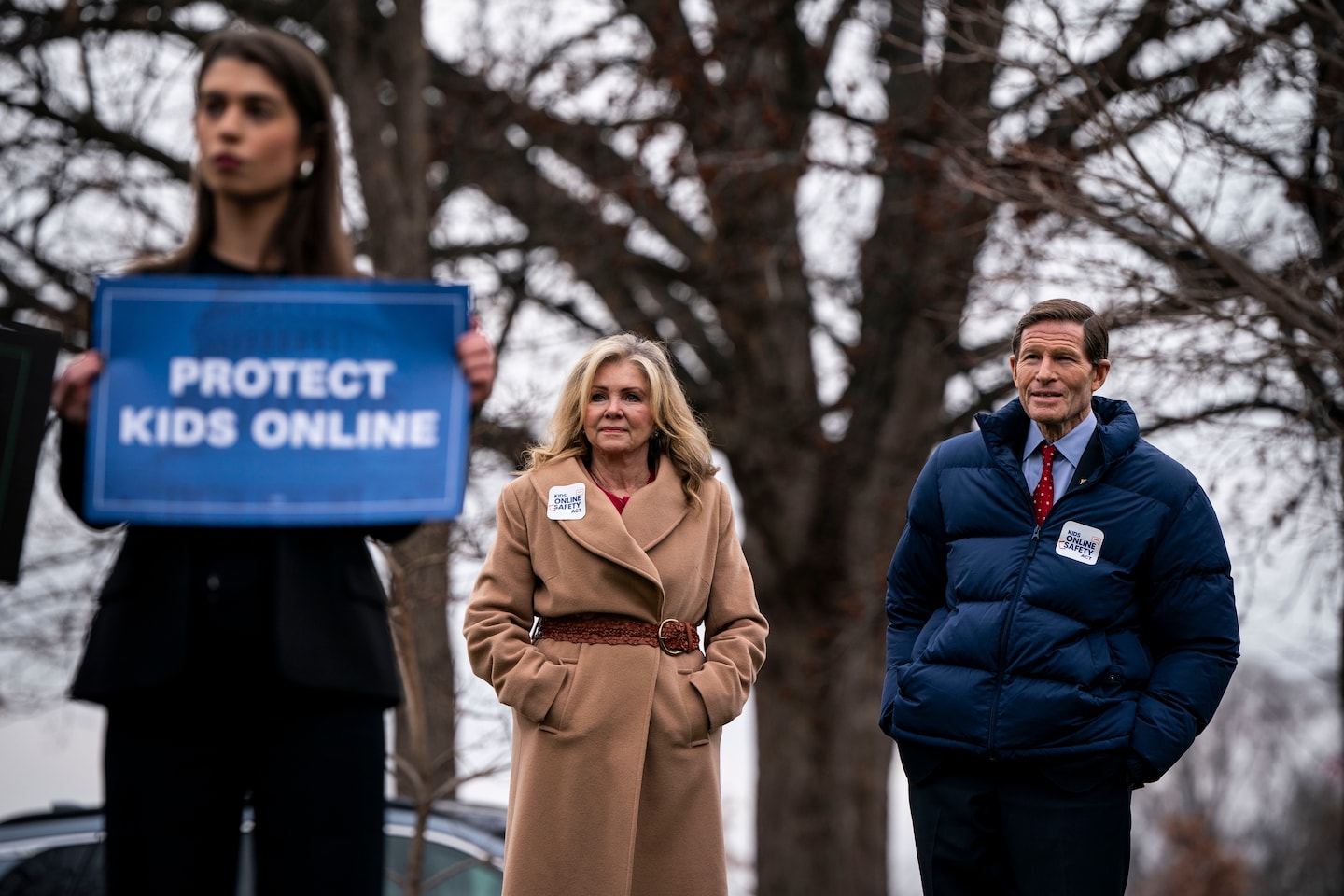
Kids Online Safety Act secures enough support to pass Senate
- Science
- February 15, 2024
- No Comment
- 217
The measure would also require that platforms enable their most protective privacy and safety settings by default for younger users and offer parents greater tools to monitor their kids’ activity.
Sens. Richard Blumenthal (D-Conn.) and Marsha Blackburn (R-Tenn.) unveiled a fresh version of the bill Thursday with more than a dozen new co-sponsors, including Senate Majority Leader Charles E. Schumer (D-N.Y.), updating it in part to assuage long-running concerns by human rights groups that it could be weaponized to target LGBT youths and stifle speech online.
If passed, it would become the first major consumer privacy or child online safety measure to clear a chamber of Congress in decades. Congress has failed to pass major new internet laws despite years-long attempts to rein in Silicon Valley giants.
Even if KOSA is taken up and passed in the Senate, however, it cannot become law without significant new support in the House, where it has yet to be introduced amid disputes between the two chambers over which tech issues to prioritize. Children’s safety advocates have expressed optimism that by passing KOSA, the Senate could put pressure on the House to follow suit.
“This overwhelming bipartisan support for the Kids Online Safety Act … reflects the powerful voices of young people and parents who want Congress to act,” Blumenthal and Blackburn said in a joint statement.
The proposal gained significant traction in Washington amid mounting bipartisan concern that social media platforms could deepen mental health issues among kids and teens and expose children to dangerous material online.
The push gained major backers, including President Biden, who endorsed the bill in July, saying of KOSA: “Pass it. Pass it. Pass it.”
But after dozens of human rights, digital rights and tech industry groups opposed the bill, citing concerns that state enforcers could use its provisions to target young LGBT users, its future has been uncertain.
The updated version seeks to head off concerns by stripping key enforcement powers from state attorneys general and giving regulators at the Federal Trade Commission a more central role in overseeing its protections. Blumenthal’s office released a letter from more than a half-dozen LGBT rights groups rescinding their opposition to the measure due to the changes.
The groups, which include GLAAD and the Human Rights Campaign, said the adjustments lawmakers made to KOSA “significantly mitigate the risk of it being misused to suppress LGBTQ+ resources or stifle young people’s access to online communities.”
The measure already had backing from nearly half the Senate, but senators announced new support from key lawmakers, including Sen. Ted Cruz (Tex.), the top Republican on the commerce committee, and Schumer, who ultimately decides whether and when bills get taken up on the floor. Senators made the proposal a significant focus during a recent high-profile hearing on child safety with the CEOs of Meta, TikTok and other tech firms.
The Senate’s filibuster rules typically force lawmakers to secure at least 60 votes out of the 100-member chamber to pass most legislation, a milestone the bill’s backers are now poised to clear. But the bill, which lacks a House companion, still faces an unclear path to becoming law.
While senators have largely focused on advancing more stringent protections for children and teens online, House lawmakers have devoted their energy to attempting to pass a so-called comprehensive data privacy bill that would expand safeguards for all users, not just kids. The key House committee in 2022 cleared a landmark privacy bill, but the push has since stagnated.
Common Sense Media CEO Jim Steyer, whose group advocates for stronger protections for kids online and is closely allied with the Biden administration, said the House, “will either join the Senate … or they will be viewed as the reason Congress failed to make the internet healthier and safer for kids, teens, and families.”
The impasse between House and Senate leaders has created a regulatory vacuum that state legislators have increasingly sought to fill by passing their own privacy and child safety bills. But states’ child safety efforts have faced numerous legal setbacks, with industry groups winning early legal challenges to halt laws that would otherwise impose stricter safety obligations on tech companies or require that parents sign off on their teens’ social media use.
State AGs, meanwhile, have launched a flurry of investigations into the ways social media platforms could be hurting kids by deploying addictive design features, culminating in a barrage of lawsuits against Facebook and Instagram parent company Meta in October.
Efforts to broaden protections for children online gained momentum after Facebook whistleblower Frances Haugen disclosed internal research in 2021 showing that the company’s platforms at times worsened body image issues among some teenage girls. After the disclosures, Blumenthal and Blackburn launched an investigation that included hearing from Haugen at a blockbuster session and ultimately led to the creation of KOSA.
Despite dozens of congressional grillings with tech executives and years of hand-wringing over social media’s potential dangers, lawmakers on Capitol Hill have passed no significant new measures in decades to restrict how platforms handle users’ activity and data.
Lawmakers in 2018 passed a law to open tech companies up to greater liability if they facilitated sex trafficking online, but have failed to convert on countless other legislative efforts on tech.
Another group of senators has called for the chamber to take up a separate package of bills aiming to make it easier for users to sue tech companies over child sexual images online. Senators have suggested the bills could move together in one package along with KOSA, but it’s not immediately clear whether the other proposals have sufficient support to pass.
“With new changes to strengthen the bill and growing support, we should seize this moment to take action,” Blumenthal and Blackburn said.
#Kids #Online #Safety #Act #secures #support #pass #Senate








